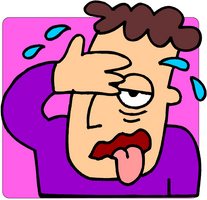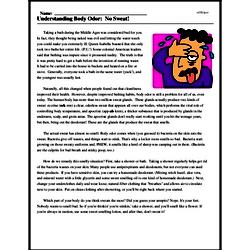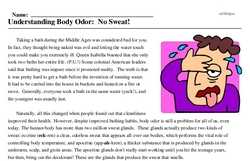Understanding Body Odor: No Sweat!
Taking a bath during the Middle Ages was considered bad for you. In fact, they thought being naked was evil and letting the water touch you could make you extremely ill. Queen Isabella boasted that she only took two baths her entire life. (P.U.!) Some colonial American leaders said that bathing was impure since it promoted nudity. The truth is that it was pretty hard to get a bath before the invention of running water. It had to be carried into the house in buckets and heated on a fire or stove. Generally, everyone took a bath in the same water (yuck!), and the youngest was usually last.
Naturally, all this changed when people found out that cleanliness improved their health. However, despite improved bathing habits, body odor is still a problem for all of us, even today. The human body has more than two million sweat glands. These glands actually produce two kinds of sweat: eccrine (eck-ren) a clear, odorless sweat that appears all over our bodies, which performs the vital role of controlling body temperature, and apocrine (app-ah-kren), a thicker substance that is produced by glands in the underarm, scalp, and groin areas. The apocrine glands don't really start working until you hit the teenage years, but then, bring out the deodorant! These are the glands that produce the sweat that smells.
The actual sweat has almost no smell. Body odor comes when (you guessed it) bacteria on the skin eats the sweat. Bacteria give off wastes, and things start to stink. That's why a locker room smells so bad. Bacteria start growing on those sweaty uniforms and, PHEW, it smells like a herd of sheep was camping out in there. (Bacteria are the culprits for bad breath and stinky poop, too.)




